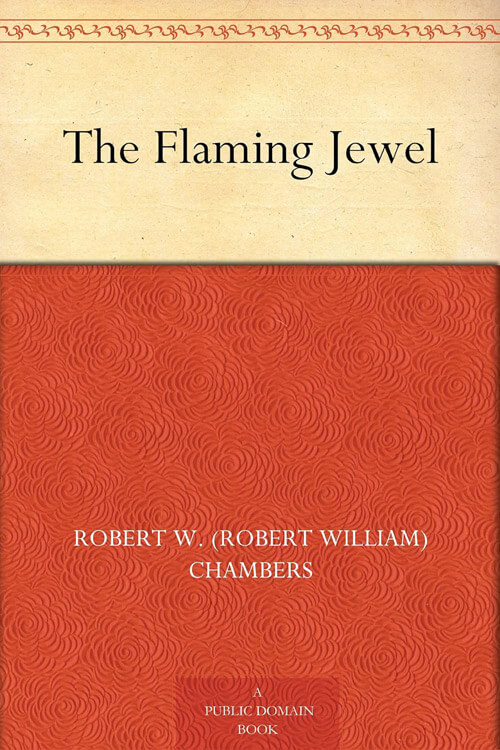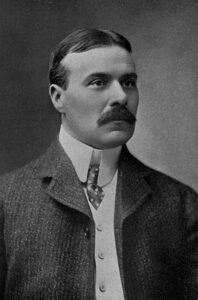
The Flaming Jewel
Two State Troopers drew bridles in the yellowing October forest. Their intelligent, drab uniforms, touched with purple, blended harmoniously with the autumn woods. They were as inconspicuous as two deer in the dappled shadow. There was a sunny clearing just ahead. The wood road they had been travelling entered it. Beyond lay Star Pond.
Trooper Lannis told Trooper Stormont: “That’s Mike Clinch’s clearing. Our man may be there. Now we’ll see if anybody tips him off this time.”
The forest and clearing were very still in the sunshine. Nothing stirred save gold leaves drifting down and a hawk high in the deep blue sky turning in narrow circles.
Lannis was instructing Stormont, who had been transferred from the Long Island Troop and was unfamiliar with local matters.
Lannis said: “Clinch’s dump stands on the other edge of the clearing. Clinch owns five hundred acres in here. He’s a rat.”
“Bad?”
“Well, he’s mean. I don’t know how bad he is. But he runs a rotten dump. The forest has its slums, as does the city. This is the Hell’s Kitchen of the North Woods.”
Stormont nodded.
“All the scum of the wilderness gathers here,” went on Lannis. “Here’s where half the trouble in the North Woods hatches. We’ll eat dinner at Clinch’s. His stepdaughter is a peach.”
The sturdy, sun-browned trooper glanced at his wristwatch watch and stretched his legs in his stirrups.
“Jack,” he said, “I want you to get Clinch right, and I will tell you about his outfit while we watch this road. It’s like a movie. Clinch plays the lead. I’ll dope out the scenario for you——”
Read or download Book
Robert W. Chambers
Robert William Chambers (May 26, 1865 – December 16, 1933) was an American artist and fiction writer best known for his book of short stories, The King in Yellow, published in 1895.
Biography.
Chambers was born in Brooklyn, New York, to William P. Chambers (1827–1911), a corporate and bankruptcy lawyer, and Caroline Smith Boughton (1842–1913). His parents met when his mother was twelve, and William P. was interning with her father, Joseph Boughton, a prominent corporate lawyer. Eventually, the two formed the law firm Chambers and Boughton, which continued to prosper after Joseph died in 1861. Robert Chambers’s great-grandfather, William Chambers (birth unknown), a lieutenant in the British Royal Navy, was married to Amelia Saunders (1765–1822), a great-granddaughter of Tobias Saunders of Westerly, Rhode Island. The couple moved from Westerly to Greenfield, Massachusetts, and then to Galway, New York, where their son, William Chambers (1798–1874), was born. The second William graduated from Union College at 18 and then went to a college in Boston, where he studied medicine. Upon graduating, he and his wife, Eliza P. Allen (1793–1880), a direct descendant of Roger Williams, the founder of Providence, Rhode Island, were among the first settlers of Broadalbin, New York. His brother was the architect Walter Boughton Chambers.
Chambers was first educated at the Brooklyn Polytechnic Institute and then entered the Art Students’ League at around twenty, where the artist Charles Dana Gibson was a fellow student. Chambers studied in Paris at the École des Beaux-Arts and the Académie Julian from 1886 to 1893, and his work was displayed at the Salon as early as 1889. On his return to New York, he succeeded in selling his illustrations to Life, Truth, and Vogue magazines. Then, for reasons unclear, he devoted his time to writing and producing his first novel, In the Quarter, written in 1887 in Munich. His most famous, and perhaps most meritorious, effort is The King in Yellow, a collection of Art Nouveau short stories published in 1895. This included several famous weird short stories connected by the theme of a fictitious drama of the same title, which drives those who read it insane. E. F. Bleiler described The King in Yellow as one of the most important works of American supernatural fiction. It was also enormously admired by H. P. Lovecraft and his circle.
Chambers returned to the weird genre in his later short story collections The Maker of Moons, The Mystery of Choice, and The Tree of Heaven, but none earned him as much success as The King in Yellow. Some of Chambers’s work contains science fiction elements, such as In Search of the Unknown and Police!!!, about a zoologist who encounters monsters.
Chambers’s main work of historical fiction was a series of novels set during the Franco-Prussian War. These novels were The Red Republic (1895, centring on the Paris Commune), Lorraine (1898), Ashes of Empire (1898), and Maids of Paradise (1903). Chambers wrote Special Messenger (1909), Ailsa Paige (1910), and Whistling Cat (1932), novels set during the American Civil War. Chambers also wrote Cardigan (1901), a historical novel for younger readers set at the outbreak of the American Revolution. Chambers later turned to writing romantic fiction to earn a living. According to some estimates, Chambers had one of his period’s most successful literary careers, his later novels selling well and a handful achieving best-seller status. Chambers’ romance novels often featured intimate relationships between “caddish” men and sexually willing women, resulting in some reviewers accusing Chambers’ works of promoting immorality. Many of his works were also serialized in magazines.
His novel The Man They Hanged was about Captain Kidd and argued that Kidd was not a pirate but had been made a scapegoat by the British government. During World War I, Chambers wrote war adventure novels and war stories, some of which showed a solid return to his old weird style, such as “Marooned” in Barbarians (1917). After 1924, he devoted himself solely to writing historical fiction. For several years, Chambers made Broadalbin, New York, his summer home. Some of his novels touch upon colonial life in Broadalbin and Johnstown. On July 12, 1898, he married Elsa (Elsie) Vaughn Moller (1872–1939). They had a son, Robert Edward Stuart Chambers (1899–1955) (who sometimes used the name Robert Husted Chambers).
Robert W. Chambers died on December 16, 1933, after having undergone intestinal surgery three days earlier.






